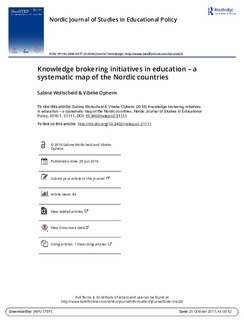Knowledge brokering initiatives in education – a systematic map of the Nordic countries
Journal article, Peer reviewed
Published version
Permanent lenke
http://hdl.handle.net/11250/2471802Utgivelsesdato
2016Metadata
Vis full innførselSamlinger
Originalversjon
10.3402/nstep.v2.31111Sammendrag
The international trend of evidence-based practice has led to the establishment of a new type of organisation, knowledge brokering initiatives, to strengthen the link between research-based knowledge and policy and practice. Policymakers in many countries, among them the Nordic countries, have increasingly paid attention in grounding decisions on the best evidence, for example, to addressing declining learning outcomes among students. Even though the Nordic countries share a long tradition of lifelong learning and valuing research in policy-making, the establishment of such initiatives in education is a relatively new phenomenon. Applying a systematic mapping approach, our purpose is to portray existing initiatives in the five Nordic countries, Denmark, Finland, Iceland, Norway and Sweden, by describing similarities and differences in their main characteristics, organisation, mandate and conceptions of knowledge and methods. In general, we find different patterns of initiatives across the Nordic countries, with the highest number and variation in Denmark, in contrast to Finland with a less varied pattern and a broader concept of evidence-informed practice. By discussing the findings in light of context differences in the link between teacher education and research, we provide some implications for further research.
